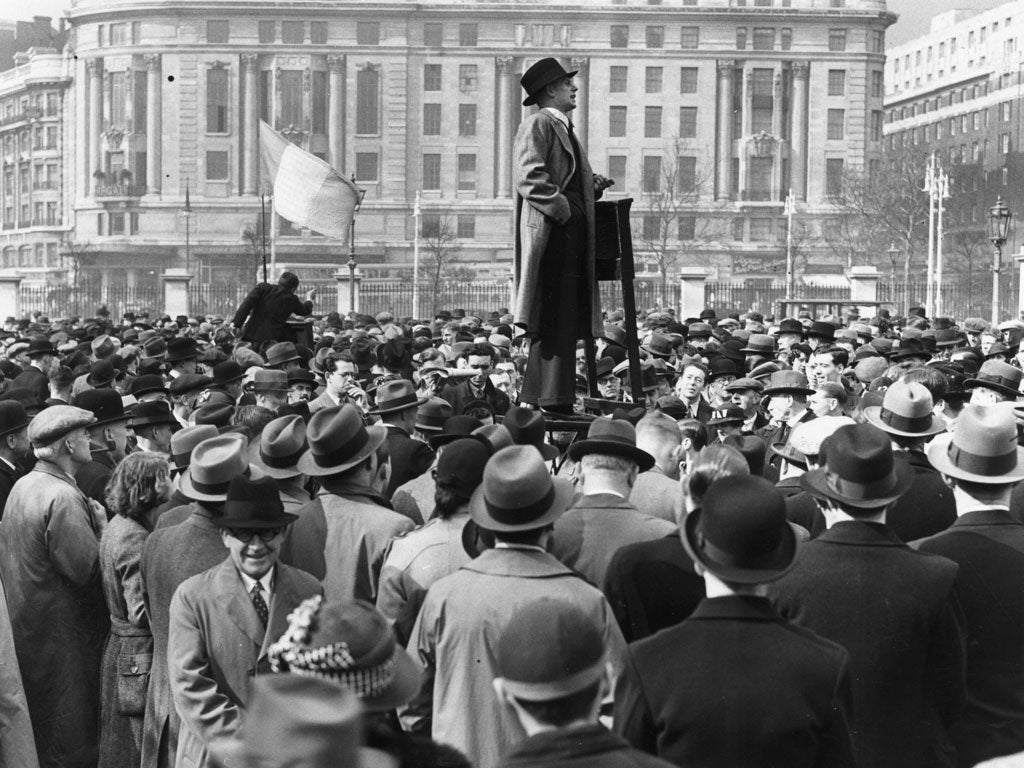Against the new conformism
A new spirit of conformism and political correctness is stifling our culture and the eccentrics within it


Your support helps us to tell the story
From reproductive rights to climate change to Big Tech, The Independent is on the ground when the story is developing. Whether it's investigating the financials of Elon Musk's pro-Trump PAC or producing our latest documentary, 'The A Word', which shines a light on the American women fighting for reproductive rights, we know how important it is to parse out the facts from the messaging.
At such a critical moment in US history, we need reporters on the ground. Your donation allows us to keep sending journalists to speak to both sides of the story.
The Independent is trusted by Americans across the entire political spectrum. And unlike many other quality news outlets, we choose not to lock Americans out of our reporting and analysis with paywalls. We believe quality journalism should be available to everyone, paid for by those who can afford it.
Your support makes all the difference.Three stories have particularly caught my eye over the past week. On Tuesday, Nadia Eweida, a 60 year-old Christian, won her case in the European Court of Human Rights after being prevented by British Airways from wearing a crucifix around her neck. The company said she contravened their uniform codes, but the judges who found in her favour said that her human right to “freedom of thought, conscience and religion” had been violated.
The day before, John Mulholland, editor of The Observer newspaper, withdrew from online publication a column about transsexuals by the journalist Julie Burchill. It had been deemed editorially fit to appear in his paper over the weekend, but so outraged was much of the online reaction that Mr Mulholland digitally spiked the piece and issued a statement apologising for “the hurt and offence caused”. This came after a senior Liberal Democrat, Lynne Featherstone, called on Twitter for Burchill to be sacked for her “bigoted” views.
And last weekend, newspapers and websites were full of lurid revelations about Jimmy Savile, the television presenter and paedophile who abused hundreds of children over decades. What he did was unspeakably horrific, and yet there was a curious undercurrent in the coverage, with acres of commentary devoted to the weird dress sense and other eccentric habits of this sinister criminal.
His idiosyncratic style, if that’s what it can be called, was universally interpreted as incriminating evidence against him. To be a paedophile is one thing, this line of thinking suggests; but to be a paedophile and wear those outfits, with those glasses, under that hairstyle? That is something altogether nastier.
It reminded me of nothing so much as the disgraceful persecution of Christopher Jefferies, the retired teacher wrongly accused of the murder of Joanna Yeates in 2010, chiefly on the grounds that he had unusual hair.
On the surface, these stories appear minimally related, if at all. And yet there is a common thread between them. They originate from, and solidify, a spirit of conformism, consensus, and political correctness which is spreading through our culture like a forest wildfire, stifling free thought, and strangling the very thing which made this country great — intellectual freedom and tolerance.
Every day I come across countless examples of this suffocating tendency. After the expenses crisis, politicians I speak to are more afraid than ever of saying what they really think, lest some newspaper or potential voter howls with indignation. Health and safety fanaticism — which is not some conspiracy of tabloid invention but an actual onslaught of regulation and bureaucracy on our daily lives — is part of the same thing. In science, the elevation of the precautionary principle — “better safe than sorry”, whatever that means — to an exalted status within public policy is inhibiting experimentation and the discovery of knowledge.
Naturally I’m far from alone in despising this trend, or being frustrated by its effect on our behaviour. Nor is it an entirely new phenomenon, because its roots go back to at least the beginning of the New Labour years. But I come to it as a Russian, which makes it uncomfortably familiar. Throughout the past few centuries, various powerful actors took it in turns to dampen the temper of the Russian people. First it was the repressive tsars and reactionary Russian Orthodox Church, then it was the Communist Party. All of them set out, and often grimly succeeded, in smoothing the frayed edges of Russia’s great intellectual tradition. Soviet culture became as monotone as the Siberian steppes in winter.
Thankfully we haven’t reached that state in 21st-century Britain. But anyone who cares for this country's future should be discomfited by the direction of travel, especially so considering our cultural heritage. As David Horspool writes in his book The English Rebel, this island has been unique in the world for its celebration of heretics and eccentrics.
From the cross-dressing rascals of Jacobean theatre to liberal fundamentalists like John Milton, for whom censorship was an unpardonable sin, to the forefathers of the Scottish Enlightenment, who dared to suggest that there was no such thing as divine authority, we have always given space to those who would go where others feared to tread.
Our future prosperity and success as a people depends on cultivating this distinguished tradition. Taking delight in outlandish behaviour and eccentric characters isn’t some abstract good or passing fancy. Rather it is a necessary foundation of any flourishing culture, and noticeable by its absence in the barren cultural wastelands where censorship and intolerance reign. All human progress is driven by those who are prepared to say the unsaid and think the unthinkable. “Do not fear to be eccentric in opinion,” Bertrand Russell said, “for every opinion now accepted was once eccentric.” This ought to serve as a motto for our political class, where eccentrics, long an endangered species, are now in grave danger of extinction.
For all that, this remains a country where intellectuals can thrive. We have the best universities in the world, and as such many of the best graduates; we have countless entrepreneurs who would willingly forgo a month’s pay in pursuit of their dreams; and as this newspaper details every day, we have artists and thinkers whose creativity no amount of censorship could destroy. But as you survey the news in the days and weeks to come, watch out for attempts to eradicate eccentricity, and impede free thought and expression. And if you can bring yourself to, please join me in the fight against it, because the country you and I love is sleepwalking into a Soviet future.
Evgeny Lebedev is the owner of the Evening Standard and the Independent. Follow him on Twitter @mrevgenylebedev
Join our commenting forum
Join thought-provoking conversations, follow other Independent readers and see their replies
Comments